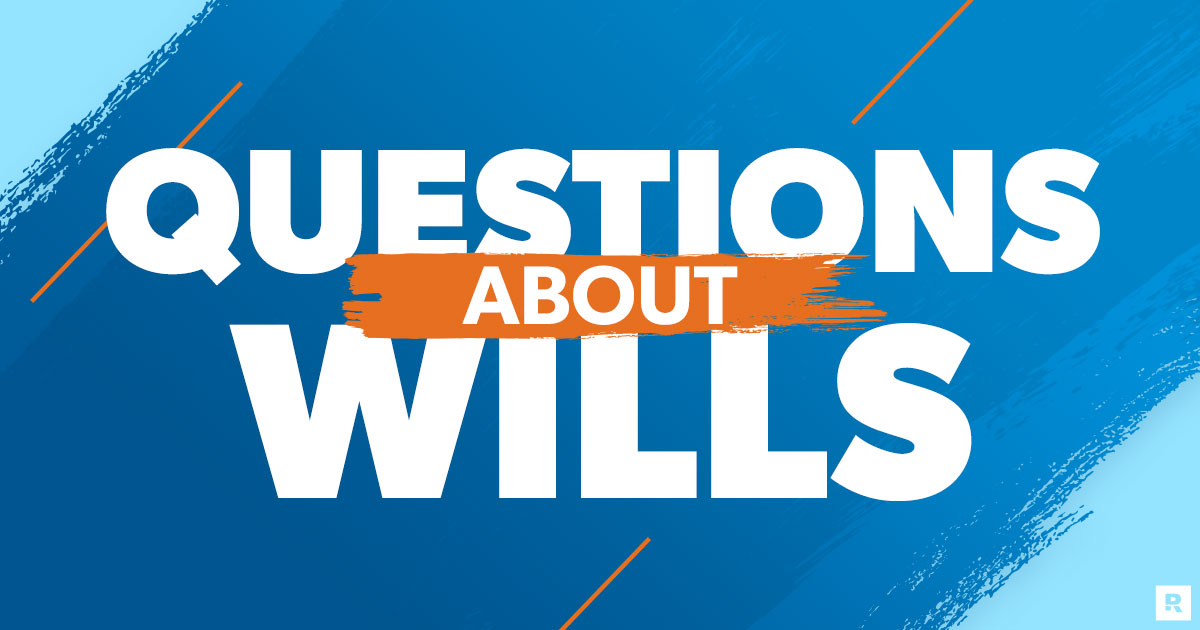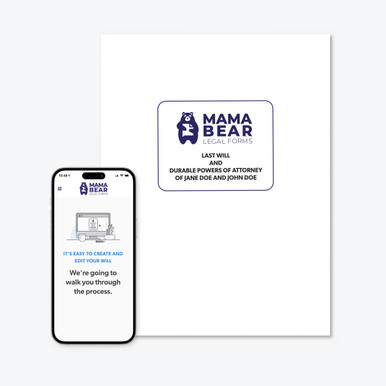Your Top 10 Will Questions Answered
10 Min Read | Apr 16, 2025

I know—nobody wants to talk about making a will. It makes us anxious, uncomfortable, and maybe even a little bit queasy. So, we dodge the topic left and right and put off making a will yet again.
But then there’s that other feeling—that cold-in-the-armpits, slightly panicky feeling. It comes when it hits you, What if something happens to me? Or my spouse? What would happen to the kids? How would anyone know what to do?
So here you are, reading about wills because you know making one will protect your family if anything happens to you. I’m proud of you for being here. Now take a deep breath. I’m going to answer some common questions about wills so you can take the next step and get one!
- What Is a Will?
- What’s the Difference Between a Living Trust and a Will?
- Why Do I Need a Will?
- What if I Haven’t Had Kids Yet?
- How Is a Will Executed?
- Does a Will Have to Be Notarized?
- Can I Change or Cancel My Will?
- When Should I Update My Will?
- After I Make a Will, Who Should I Give Copies To?
- What Happens to My Stuff if I Don’t Have a Will?
Will an online will work for you?
Find out if an online will works for you in less than 5 minutes.
1. What Is a Will?
First off, let’s talk about what a will is: A will is a legally binding document that explains exactly what you want to happen to your property (or kids!) after your death. Making a will is one of the most important things you can do for yourself and the people you care about.
Save 10% on your will with the RAMSEY10 promo code.
Think about it this way, guys. When you die with a legal will in place, your stuff goes to the people or organizations you name in your will. If you die without a legal will—often called dying intestate—everything you owned is handled by your state’s probate court (that’s the legal court process of giving out your belongings). And guess what? That’s potentially setting up a long, unpleasant, expensive battle for the people you care about. In some cases, they may not even get what you wanted them to.
2. What’s the Difference Between a Living Trust and a Will?
This is another question about wills that comes up all the time.
A living trust and a will might seem similar in the way they work, but they’re actually pretty different. A will tells everyone what you want done with the stuff you own after you die. A living trust holds your assets while you’re still living.
There’s more. A living trust never becomes a public document like a will does after you die. So, if you want to keep everything private, a living trust protects that information, even after you’re gone. It can also help you skip out on probate costs. Any property given through a will has to go through probate, but not if it’s given through a trust!
Keep in mind, though: A living trust can’t name a guardian for your minor children (someone who will look after them if you die). Only a will can do that.
Don't Know Where to Start With a Will?
Download our will worksheet to get started.
3. Why Do I Need a Will?
I know, I know. Wills seem like something for the uber wealthy with crazy families and expensive collectibles—that’s sure how the movies make it look. So you might think you don’t need a will. But guess what? You need a will, no matter who you are.
And if you have kids under 18, you really need a will. Your will is where you’ll have all the information about who their guardians will be. If you don’t make a will, who will take care of your kids if something happens to you and your spouse? Let me tell you: the state. I have three kids and I couldn’t imagine the state deciding who takes care of them! Don’t leave a decision like that in the hands of anyone but you (especially not the state).
4. What if I Haven’t Had Kids Yet?
So, you think because you don’t have kids, making a will doesn’t matter? Wrong. I know I just said it, but it’s worth repeating: Everybody needs a will! Even if it’s just you and your pug living in a one-bedroom apartment. Who would take Bruce if something happened to you? And if you do have kids later on (or a niece or nephew you adore), you can update your will to include them.
5. How Is a Will Executed?
This one’s easy, y’all. Executing a will is the technical term for signing your will and making it legally binding.
To execute a will in any state in the U.S., two things are required:
- You need to sign your will while you’re of sound mind.
- Two people have to sign the will as witnesses.
A sidenote about your witnesses: Make sure you aren’t leaving anything to them in your will (because they probably won’t get whatever it is!). Most states won’t let a witness get anything from the will they’re witnessing. So, skip asking your daughter (who’s getting your house in the will) to be your witness and ask a trusted coworker or family friend instead.
6. Does a Will Have to Be Notarized?
One of the most common questions I hear about wills is, Does a will have to be notarized?
The answer is technically no, but I’d recommend it anyway. Getting your will notarized adds an extra layer of protection. You just never know who’s going to feel rejected and argue about your assets after you’re gone.
While getting your will notarized isn’t always required by law, some states do want a document (called a self-proving affidavit) signed by two witnesses stating they saw you sign your will or saw someone sign it for you at your request. This document also proves you were in your right mind and signed everything willingly.
Interested in learning more about estate planning?
Sign up to receive helpful guidance and tools.
7. Can I Change or Cancel My Will?
Absolutely! This thing isn’t set in stone. Nothing is permanent until you’ve passed away. You can add or remove things at any time while you’re still alive.
With that in mind, let’s talk about changing your will. In most states, you can change your will using a legal document called a codicil.
What does codicil mean? I’m so glad you asked. Think of a codicil as an amendment or supplement to your will. You can use a codicil if you want to make one or two minor changes to your will but don’t want to redo the whole thing. You still need two witnesses to sign it, but they don’t have to be the same people who signed your will.
If you have major changes, it’s best to create a new will. After you sign your new will, be sure to securely get rid of your old will (I’d run that thing through the shredder). And if you gave copies to anyone else, be sure you’re the one who shreds those too. This way, there won’t be any confusion over which one is the right will.
Now let’s say you want to cancel your will. You can do that anytime between creating your will and your death. All that means is, you no longer want your will to be valid or effective if you die.
Each state has different rules for how to cancel a will (aka shredding, burning and tearing). You’ll want to check with your state’s laws to find out how to legally cancel your will.
8. When Should I Update My Will?
You need to update your will anytime your wishes change or after experiencing a big life event like getting married (yay!). Here are some common life events that could require changing your will:
- You experience a major life-change, like getting married, having another child, or adopting a child.
- You gain more property.
- You get rid of property.
- You create new relationships or end old relationships.
- You change your charitable interests.
- You want to name a different executor.
Don’t forget that you may need to update your will after any kind of unpleasant life-change too (like the death of a family member or a divorce).
The least expensive way to update or cancel your will without paying lawyer fees is by using an online will creation service.
9. After I Make a Will, Who Should I Give Copies To?
After you sign your will, keep a copy for yourself (important!) and give a copy to the person you named as your executor (that’s someone you trust who will make sure your wishes are carried out after you die). If you decide not to give them a physical copy of the will, at least let them know where you keep your will so they can get to it if they need to.
And while we’re on the subject, here’s another common question I hear: Are beneficiaries entitled to a copy of the will? The answer is yes, all beneficiaries named in a will should get a copy of the will so they can understand their inheritance.
Finally, if you update your will, be sure to get rid of the copies others have—and most importantly—do this yourself! If you trust them with your will, then you probably trust them a lot. Still, it’s a good idea to go ahead and destroy the old document yourself.
10. What Happens to My Stuff if I Don’t Have a Will?
Whether you know it or not, you already have a will in place . . . kind of. Even if you’ve never signed a will, there are laws in your state that handle how to sort through your personal belongings after death without a will.
This type of thing is called an intestacy law. And that’s basically a fancy way of saying the state will sort things out for you if you don’t have a will. There’s a “but” here, though.
But then your family is in for a world of hurt because when there’s no will, probate takes over. Your family will head to probate court—and that’s a real headache. It can often take up to a year of back and forth.
When you die without a will, probate court decides things like which one of your family members gets your property, belongings and even your children who are under 18. Yikes. Don’t let that happen!
Creating Your Will Is Easier Than You Think
See guys? That wasn’t even that bad. I’m willing to bet that queasy feeling is gone. And now you know how to replace that second, anxious feeling with peace of mind.
Y’all, creating a will is one of the most important and loving things you can do for your family. And believe it or not, it’s super easy and affordable to make your own will online. With RamseyTrusted partner Mama Bear Legal Forms, all you do is plug in your important information and the rest is done for you—all in less than 20 minutes!
And the best part? Even though Mama Bear’s legal forms are created by attorneys, they’re not full of confusing legal jargon, so you and your loved ones will understand what it says.
Next Steps
- Still not sure you need a will? Dive into why you definitely need one.
- Learn more about how to write a will.
- Take our quiz to figure out if an online will works for you.
- Get started on your online will with RamseyTrusted provider Mama Bear Legal Forms.





